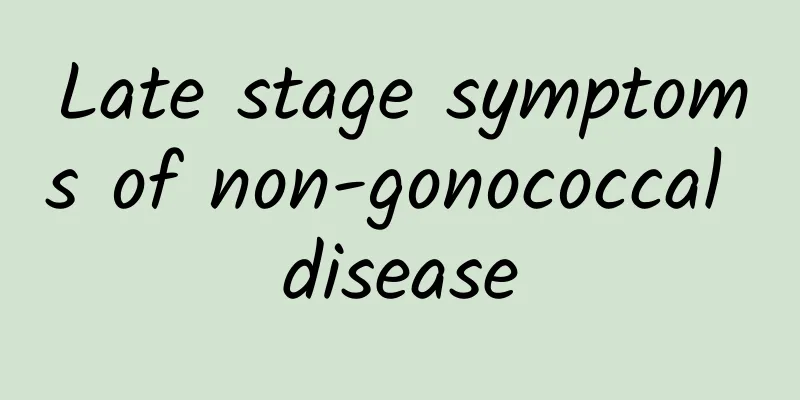Late stage symptoms of non-gonococcal disease

|
Non-gonococcal urethritis refers to non-gonococcal urethritis, which is a relatively common sexually transmitted disease. The main pathogens are Mycoplasma and Mycoplasma trachomatis. Clinically, it often manifests symptoms of urethritis. The most common ones are stinging pain during urination, dysuria, urgency, frequency, difficulty urinating, etc. At this time, some secretions often appear at the urethral opening during urination. If it is not treated properly, it will also have a relatively large impact on other tissues of the reproductive system and urinary system. Late stage symptoms of non-gonococcal disease 1. Typical symptoms include urethral itching, accompanied by urinary urgency, pain and difficulty urinating, but the symptoms are milder than those of gonococcal urethritis. 2. No symptoms or a small amount of sticky secretions. When not urinating for a long time or before the first urination in the morning, a small amount of mucous secretions may be secreted from the anus. Sometimes it is only manifested as a scab seal or dirty underwear. A considerable number of people may not have any symptoms. 3. Male patients with urogenital system inflammation may develop epididymitis. Female patients are not as typical as male patients. Many patients may be asymptomatic. They may generally suffer from urethritis, mucopurulent cervicitis, acute pelvic inflammatory disease and infertility. The main complications in men are epididymitis, prostatitis and Reiter's syndrome; the main complications in women are salpingitis, pelvic inflammatory disease, ectopic pregnancy and infertility. Western medicine treatment 1. Currently, many strains have become resistant to tetracycline, doxycycline and erythromycin. The new generation of synthetic antibacterial drugs, quinolones, are not only effective against Chlamydia and Mycoplasma, but are also highly sensitive to gonococci. 2. Sulfonamides and rifampicin are effective against chlamydia but ineffective against mycoplasma. 3. Gentamycin, neomycin and polymyxin are ineffective against chlamydia. 4. Streptomycin and spectinomycin are ineffective against chlamydia, but effective against mycoplasma. 5. Tetracycline. 6. Doxycycline. 7. Erythromycin stearate. 8. Erythromycin ethyl succinate. 9. Minocycline. Chinese medicine treatment In view of the etiology and pathogenesis of non-gonococcal urethritis, Chinese medicine treatment focuses on clearing away heat and detoxifying, promoting dampness and relieving stranguria, supplemented by tonifying the kidney and strengthening the foundation, promoting blood circulation and removing blood stasis, strengthening the body and eliminating evil, and improving the body's immunity, such as the Chinese herbal medicine Yinhua Miyanling Tablets. It is mainly used to treat heat-stranguria in the lower abdomen and damp-heat syndrome, and has obvious effects on frequent urination, urgency, painful and difficult urination, short and red urine, dribbling urine, red and yellow urine, low back pain, and abdominal distension and pain. |
<<: Symptoms of Yang deficiency cold
>>: Symptoms of hypothyroidism in subacute thyroiditis
Recommend
1Baby shakes his head violently while sleeping
Many female friends feel overwhelmed after giving...
What is a dentigerous cyst? Do you know what dental cyst is?
A dentigerous cyst is a cystic lesion associated ...
Does drinking anti-inflammatory tea have any effect?
Many people have symptoms of excessive liver fire...
What are the symptoms of postpartum laceration inflammation?
After giving birth, if the pregnant woman does no...
The efficacy and function of Chinese medicine aconite
Sometimes when we have some diseases, we will use...
What are the symptoms of qi and blood attacking the heart?
Traditional Chinese medicine is a great cultural ...
Can lying in bed make the gestational sac grow upwards?
If the gestational sac is relatively low, this ma...
How many wolfberries are best to eat a day?
Wolfberry is a common Chinese herbal medicine. Th...
The effect of Tiannanxing wine
Arisaema is a medicinal herb in my country. It is...
The first medicine to nourish the lungs
Nourishing the lungs is a very common method in t...
Is it okay to not treat conjunctivitis yourself?
Conjunctivitis has become a very common disease i...
What to do if your milk duct is blocked
If the milk ducts are blocked, you can apply hot ...
Can a stiff neck cause dizziness and nausea?
After getting a stiff neck, not only will your ne...
Otitis media puncture surgery
I believe that many people do not know the surgic...
When is the best time to take Chinese medicine?
With the development of science and technology, a...









